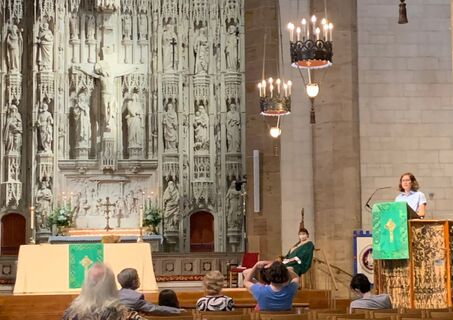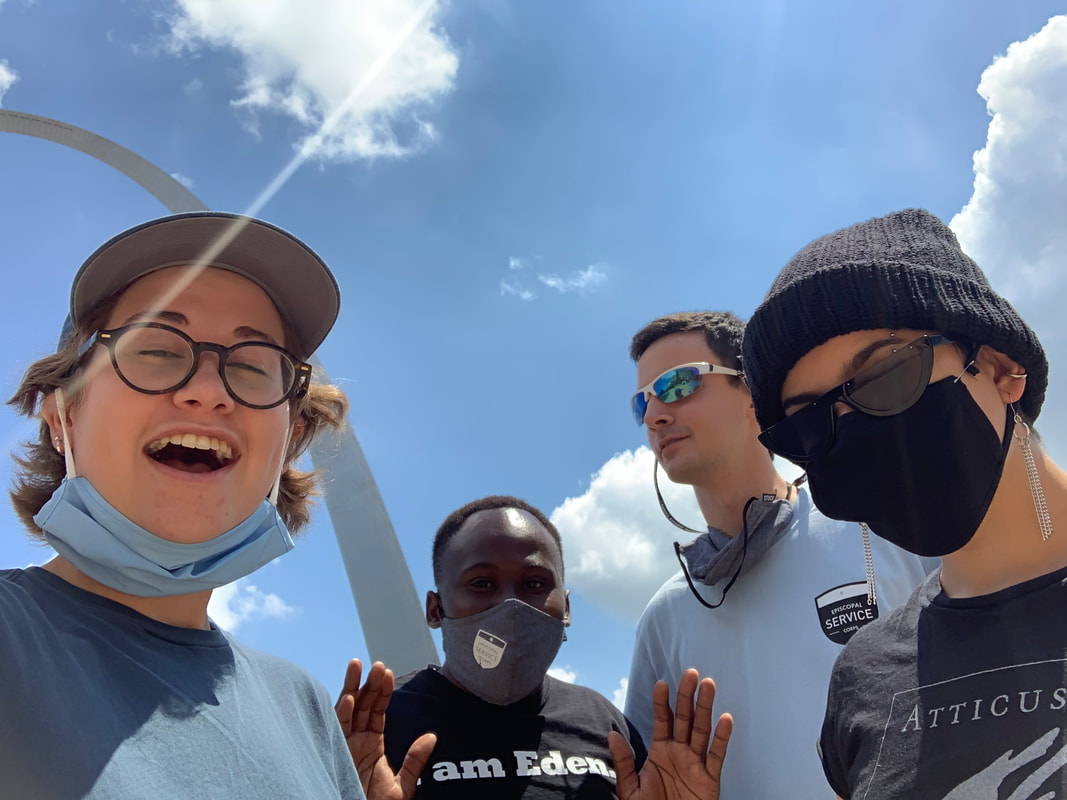 Sermon by Corps Member Maddy Bishop on 2 Corinthians 8:7-15 from June 27, 2021 at Christ Church Cathedral in St. Louis, MO. One of my favorite spiritual authors is Henri Nouwen. He writes a lot about the spiritual life, the ways of Jesus, and how Jesus’ own life is the model for how to live our own. I recently finished his book called, Letters to Marc about Jesus, and I can’t stop thinking about the chapter called “Jesus: the descending God.” In this chapter, Nouwen talks about just that, how Jesus is God descended from heaven to live among us. Jesus comes down to us not as the elite or the wealthy, but he chooses to live as a single man from Galilee with no prestige, no wealth, and no real power. I want to share with you a quote from that chapter:
“I said at the beginning of this letter that I wanted to write to you about the love of God become visible in Jesus. How is that love made visible through Jesus? It is made visible in the descending way. That is the great mystery of the Incarnation. God has descended to us human beings to become a human being with us; and once among us, he descended to the total dereliction of one condemned to death. It isn’t easy really to feel and understand from the inside this descending way of Jesus. Every fiber of our being rebels against it. We don’t mind paying attention to poor people from time to time, but descending to a state of poverty and becoming poor with the poor-- that we don’t want to do. And yet that is the way Jesus chose as the way to know God.” I believe the heart of today’s epistle is pointing us to this way of Jesus. The way of living with utter disregard for relevance, power, and security by living among, caring for, and healing the most commonly avoided so that we all may know what real freedom is. In this epistle, Paul is writing to the Christian community in Corinth. There is a bit of context that the lectionary leaves out so I am going to go ahead and read the reading again but with those earlier verses as well. If it helps, you can close your eyes and listen :) We want you to know about the grace of God that has been granted to the churches of Macedonia; for during a severe ordeal of affliction, their abundant joy and their extreme poverty have overflowed in a wealth of generosity on their part. For, as I can testify, they voluntarily gave according to their means, and even beyond their means, begging us earnestly for the privilege of sharing in this ministry to the saints— and this, not merely as we expected; they gave themselves first to the Lord and, by the will of God, to us, so that we might urge Titus that, as he had already made a beginning, so he should also complete this generous undertaking among you. Now as you excel in everything—in faith, in speech, in knowledge, in utmost eagerness, and in our love for you—so we want you to excel also in this generous undertaking. I do not say this as a command, but I am testing the genuineness of your love against the earnestness of others. For you know the generous act of our Lord Jesus Christ, that though he was rich, yet for your sakes he became poor, so that by his poverty you might become rich. And in this matter I am giving my advice: it is appropriate for you who began last year not only to do something but even to desire to do something— now finish doing it, so that your eagerness may be matched by completing it according to your means. For if the eagerness is there, the gift is acceptable according to what one has—not according to what one does not have. I do not mean that there should be relief for others and pressure on you, but it is a question of a fair balance between your present abundance and their need, so that their abundance may be for your need, in order that there may be a fair balance. As it is written, “The one who had much did not have too much, and the one who had little did not have too little.” The Jewish Christians in Jerusalem are struggling and they don’t have any money. As Paul is visiting the Gentile christians in surrounding areas, he collects money for the church in Jerusalem. He lauds the Macedonians for their generosity in the midst of their own hardship and makes note that the grace of God is evident in their selfless giving.The Macedonians gave what they could and some gave beyond what they could. They trusted that as was the case with the manna from heaven, “the one who had much did not have too much, and the one who had little did not have too little.” The Macedonian’s gave up of themselves--yes, in a real concrete way such as money, but I think the most important part is that it was monetary giving born from a place of letting go of their own self-importance in obedience to the flourishing of all people. In verse 1, it says that “the grace of God was granted to the Macedonian church” and then a few verses later, “they gave themselves first to the Lord and, by the will of God, to us.” Because the Macedonians had first surrendered themselves to God, and then to their wider communities, the overflow of the Spirit in their life made manifest in this strange act of financial giving to Jewish Christians in Jerusalem. And in verse 1, Paul calls this very act of monetary giving the grace of God made tangible. We are channels for God’s grace in all that we do, think, or say. And now, at the start of our lectionary reading, Paul is talking directly to the Corinthians. He tells them that they’re doing really good work, they are overflowing in knowledge, in their faith, speech, and in the desire of the hearts for God--but they seem to be forgetting their kinship with the church in Jerusalem and need to translate their spiritual devotion to Jesus into material action with financial giving. I wonder if the Corinthians, like many of us, were really grappling with the economic and material demands of following Jesus. There are many scriptures throughout the entirety of the Bible that require us to think seriously about how we spend our time, how many things we acquire, how much money we keep for ourselves, and to really investigate what is motivating our lifestyles. And to choose the descending way of Jesus, to turn away from the temptations of affluence, power, and security for the sake of more honestly loving and living in solidarity with others, is really, really hard-- at least for someone like me with relative social mobility and ample opportunities to choose security, privilege, and my own comfortable bubbles. As Henri Nouwen said in his earlier quote, “every fiber of our being rebels against this way.” This way of Jesus is really, really difficult and it does require sacrifices from us. But here is where I find the Gospel in this invitation to the descending way of Jesus. God’s incarnate life, in service to the poor and vulnerable, his death on a criminal's cross, and his quiet, mysterious, yet victorious resurrection offer us the chance to start really living and to truly be free, right now! But free from what, really living how? Well, for me, it means being freed from the worship of the nuclear family, from conformity to white middle class values, and from the excessive need to amass and protect private property. When we surrender to Jesus the ideas, values, and material landmarks of success that our culture says you have to have to be happy and to fit in, when we surrender those motivations not only do we become free to actually love ourselves for who we are truly are (not just who the world wants us to be), we become channels in which other people experience the grace and freedom of Jesus Christ, who came not just to “save our souls” (though that’s part of it) but to completely transform the material, social, and economic conditions of this very world, here and now. The gospel is freedom for ALL of us, not just for those of us who are marginalized, but for all of us who live under the tyranny of the Gods of American Success. Jesus frees us from all the forces in this world that want to distract us from our belovedness, from the belovedness of our friends, and from the belovedness of those completely unlike us. Jesus frees us from the lie that you have to get ahead, have lots of money, and be relevant in order to be someone of value in this world. When we surrender that lie, we come alive to God all around us and within us, and begin truly living. As Jesus said in the Gospel of Matthew, “If any want to become my followers, let them deny themselves and take up their cross and follow me. For those who want to save their life will lose it, and those who lose their life for my sake will find it. For what will it profit them if they gain the whole world but lose their soul?” When we relinquish performative allyship, we gain the opportunity for an actual relationship. When we surrender the idea of luxurious living, we lessen the distance between us and those who live on the streets. When we give up the striving to be the leader in the room (or for me, the smartest person in the room), we make space for mutual respect and vulnerability. When we give away our wealth, or take off the mask of perfection, or start hanging around people who don’t think, look, or talk like us, we can begin to hear the holy spirit telling us that we are God’s beloved, that we are loved just as we are. So we can quit the striving for perfection and chasing after material things that will never make us truly happy. When we come to trust that God’s love for us does not hinge on anything we can do or not do, we can show up in real solidarity, and go into the world in peace, at peace with ourselves and with God’s all redeeming love, to love and serve the Lord in all that we do. The grace of God will flow to us and through us, ministering not just to ourselves but in service to the whole world. Where the spirit of the Lord is there is freedom, and the Spirit of the Lord is always with us. Let us go and be real and let us go and be free, for our own sake and for the sake of others. Amen.
1 Comment
|
Categories |
|
Mailing address:
DAH c/o Diocese of Missouri 1210 Locust St. Louis, MO 63103 |
(c) 2014 - 2020 Episcopal Diocese of Missouri
|


 RSS Feed
RSS Feed